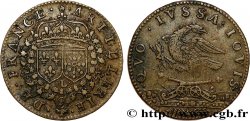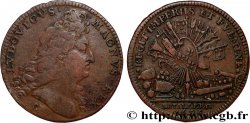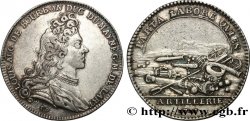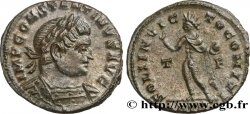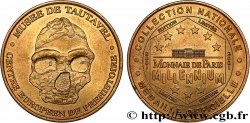Precedente 1/1
fjt_807820 - ARTILLERIE Louis-Auguste de Bourbon, duc du Maine n.d.
15.00 €
Quantità
Aggiungi al carrello

Tipo : Louis-Auguste de Bourbon, duc du Maine
Data: n.d.
Metallo : rame rosso
Diametro : 27 mm
Asse di coniazione : 6 h.
Peso : 5,78 g.
Orlo : lisse
Pedigree :
Jeton provenant de la Collection MARINECHE
Diritto
Titolatura diritto : L. A. DE. BOURBON. D. DU. MAYNE. GRD. ME. DE. L’ARTRIE.
Descrittivo diritto : Son buste à droite cuirassé et drapé, avec épaulettes ; sans signature.
Rovescio
Titolatura rovescio : REGIT IMPERIIS ET FVLMINE ; À L’EXERGUE : ARTILLERIE.
Descrittivo rovescio : Trophée militaire avec les armes de France au centre.
Traduzione rovescio : Il dirige l'armée par ses ordres et par sa foudre.
Commento
Louis-Auguste de Bourbon, duc du Maine est le fils légitimé de Louis XIV et de Madame de Montespan, né à Versailles dans la semi-clandestinité en 1670. Élevé par la veuve de Scarron, il est affligé d’un pied bot mais se révèle très intelligent. Légitimé en 1673 avec son frère le comte de Toulouse et sa sœur, il s’installe à Saint-Germain. En 1681, il reçoit de la grande Mademoiselle la Dombes et Eu et devient gouverneur du Languedoc. Il est marié à Anne-Louise-Bénédicte de Bourbon-Condé en 1692. Bon fils, il fait ses premières armes à Philippsbourg en 1689 et est à Fleurus en 1690 comme maréchal de camp. Il est à Namur, Steinkerque et devient grand maître de l’artillerie en 1694. Très aimé du roi, il reçoit rang après les princes du sang puis, après 1712, l’héritier du trône n’étant qu’un enfant fragile, il est déclaré apte à la succession de la Couronne. Il est aussi chargé par le roi de veiller à l’éducation du futur Louis XV et nommé régent, avec son frère, dans le testament de Louis XIV. Ce dernier est cassé. En 1717, l’éducation du jeune roi lui est retiré ce qui provoque son entrée dans la conspiration de Cellamare et lui vaut d’être arrêté et incarcéré. Il passa le reste de ses jours à Sceaux dans des exercices de piété et mourut en 1736 .
Louis-Auguste de Bourbon, Duke of Maine, was the legitimized son of Louis XIV and Madame de Montespan, born in Versailles in semi-clandestinity in 1670.. Raised by Scarron's widow, he suffered from a club foot but proved to be very intelligent.. Legitimized in 1673 with his brother the Count of Toulouse and his sister, he settled in Saint-Germain. In 1681, he received from the great Mademoiselle la Dombes et Eu and became governor of Languedoc. He married Anne-Louise-Bénédicte de Bourbon-Condé in 1692. A good son, he made his debut at Philippsbourg in 1689 and was at Fleurus in 1690 as a field marshal.. He was in Namur, Steinkerque and became Grand Master of Artillery in 1694. Much loved by the king, he received rank after the princes of the blood then, after 1712, the heir to the throne being only a fragile child, he was declared fit to succeed the Crown. He was also charged by the king with overseeing the education of the future Louis XV and named regent, with his brother, in the will of Louis XIV.. The latter is broken. In 1717, the young king's education was taken away from him, which led to his entry into the Cellamare conspiracy and his arrest and imprisonment.. He spent the rest of his days at Sceaux in exercises of piety and died in 1736
Louis-Auguste de Bourbon, Duke of Maine, was the legitimized son of Louis XIV and Madame de Montespan, born in Versailles in semi-clandestinity in 1670.. Raised by Scarron's widow, he suffered from a club foot but proved to be very intelligent.. Legitimized in 1673 with his brother the Count of Toulouse and his sister, he settled in Saint-Germain. In 1681, he received from the great Mademoiselle la Dombes et Eu and became governor of Languedoc. He married Anne-Louise-Bénédicte de Bourbon-Condé in 1692. A good son, he made his debut at Philippsbourg in 1689 and was at Fleurus in 1690 as a field marshal.. He was in Namur, Steinkerque and became Grand Master of Artillery in 1694. Much loved by the king, he received rank after the princes of the blood then, after 1712, the heir to the throne being only a fragile child, he was declared fit to succeed the Crown. He was also charged by the king with overseeing the education of the future Louis XV and named regent, with his brother, in the will of Louis XIV.. The latter is broken. In 1717, the young king's education was taken away from him, which led to his entry into the Cellamare conspiracy and his arrest and imprisonment.. He spent the rest of his days at Sceaux in exercises of piety and died in 1736








 Segnalare un errore
Segnalare un errore Stampate la pagina
Stampate la pagina Condividi mia selezione
Condividi mia selezione Fai una domanda
Fai una domanda Consegnare / vendere
Consegnare / vendere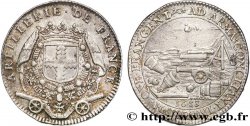
 Descrittivo
Descrittivo
